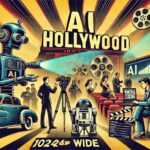Introduction: Hollywood’s New Crystal Ball
Picture this: A film script finds a desk of a studio executive. The cast looks good, and the director has a respectable history. But before the $150 million budget is approved, another voice in the room—not human but rather algorithmatic. Major studios are depending more and more on AI for data analysis to forecast box office performance, improve marketing plans, and even help to shape scripts.
Data-driven now is what used to be instinct, gut feeling, and old-fashioned market research. To project a movie’s possible popularity, predictive models scan scripts, review cast performance history, and even examine social media buzz. Though it sounds like science fiction, right now it is happening.
The tools driving this revolution, the effects on creativity, whether the silver screen still has room for human magic, and how Hollywood is using artificial intelligence for data analysis to forecast box office hits are examined in this paper.
How Studios Use AI for Data Analysis
While moviegoers focus on trailers and celebrity interviews, behind the scenes, studios are running complex simulations using AI for data analysis. These tools don’t just assist—they inform decision-making at every level, from greenlighting scripts to release date scheduling.
From Script to Screen: Predicting Performance
Here’s a step-by-step breakdown of how studios apply AI for data analysis during production:
- Script Evaluation: Based on tone, genre, pace, and dialogue, artificial intelligence tools sort scripts to forecast audience involvement.
- Cast and Crew Analysis: Data models assess actor and director marketability, comparing past box office performance across genres and regions.
- Market Timing: Algorithms recommend optimal release windows by analyzing historical trends and competition.
- Audience Targeting: AI points up important groups most likely to see the movie and recommends tailored advertising messages.
- Post-Release Projections: AI keeps changing its forecasts depending on early ticket sales, reviews, and internet comments even after a movie opens.
With so much on the line financially, it’s no surprise that AI for data analysis has become indispensable in modern film production.
Algorithms That Forecast Earnings
AI doesn’t just crunch numbers—it interprets emotions, patterns, and behaviors. When studios use AI for data analysis, they’re tapping into vast datasets that include:
- Historical box office data
- Social media trends
- Critical reception
- Star power metrics
- Audience sentiment analysis
- Genre performance over time
Key Techniques in AI For Data Analysis:
- Natural Language Processing (NLP): Used to understand and score screenplays based on structure, character arcs, and emotional resonance.
- Machine Learning Models: Trained on thousands of film releases, these models can predict box office earnings within specific confidence intervals.
- Neural Networks: Advanced AI systems that simulate human thinking, helping studios assess the unpredictable human element—emotion and buzz.
One example is predicting the “buzz factor.” If a film has a moderate budget but features a trending actor and a socially relevant theme, the algorithm may flag it as a sleeper hit—something humans may miss due to inherent biases.
Sentiment Meets Sales
Social media is also a powerful variable. Studios now analyze tweets, YouTube comments, Reddit threads, and TikTok engagement in real-time using AI for data analysis to adjust marketing strategies on the fly.
Tools Like Cinelytic and ScriptBook
Now, let’s dig into the tools fueling this transformation. Two names stand out in the conversation around AI for data analysis in Hollywood: Cinelytic and ScriptBook.
Cinelytic
Founded in Los Angeles, Cinelytic is perhaps the best-known player in this space. It combines machine learning with historical data to provide revenue forecasts, risk analysis, and project evaluations.
Features:
- Predicts financial performance across multiple markets
- Analyzes cast impact on profitability
- Evaluates script value using AI
Why It Matters: Cinelytic helps studios minimize risk by predicting how a film might perform before they spend a dime on production. It’s especially valuable for indie films and mid-budget projects, where financial margins are thin.
ScriptBook
ScriptBook, based in Belgium, offers screenplay analysis through AI for data analysis. Upload a script, and within minutes, ScriptBook returns a full report—predicting everything from age demographics to revenue potential.
Features:
- Identifies character archetypes
- Detects plot holes and pacing issues
- Forecasts box office and streaming success
Why It Matters: ScriptBook is revolutionizing early development stages. With a 70%+ accuracy rate in predicting a script’s commercial viability, it serves as a virtual script consultant.
Case Study: Warner Bros. and Cinelytic
One of the most public endorsements of AI for data analysis in Hollywood came in 2020, when Warner Bros. struck a deal with Cinelytic.
What Happened?
Using the platform to assist with film choosing, budgeting, and release plans, Warner Bros. included Cinelytic’s AI into its daily decision-making process. This was about helping creative brains with hard data, not about substituting them.
The Impact of AI for Data Analysis
- Time Saved: Execs could evaluate project profitability within hours instead of weeks.
- Risk Reduction: Data-backed decisions led to more predictable outcomes.
- Enhanced Strategy: AI helped identify trends early, such as the rising appeal of diverse casts in international markets.
While the partnership raised eyebrows, it also validated the growing role of AI for data analysis in the world’s most iconic film studio.
The Creative Dilemma: Is AI Killing the Art?
Not everyone is excited about algorithms sitting in the producer’s chair. Critics argue that using AI for data analysis might favor formulaic storytelling and box-ticking scripts over bold, original ideas.
Concerns from Creatives
- Loss of Intuition: Some filmmakers believe art shouldn’t be driven by data.
- Homogenization: AI could push studios toward “safe bets” instead of innovative narratives.
- Screenwriter Fear: If a script scores poorly with AI, does it ever get read by human eyes?
Even acclaimed director Martin Scorsese has voiced concerns, suggesting that the growing influence of tech in cinema could lead to a decline in genuine artistic expression.
But There’s Another Side While looking for AI for data Analysis
Supporters argue that AI for data analysis isn’t about dictating content—it’s about removing guesswork. They point out that AI doesn’t generate the story—it evaluates the potential impact. This allows creatives to take smarter risks and receive feedback early in the process.
In essence, AI can augment creativity, not replace it—if used ethically.
Balancing Art and Algorithms
Here’s how the best studios are managing the delicate dance between data and creativity:
- Hybrid Decision-Making: AI provides data, but human producers have the final say.
- Creative Freedom Zones: Some projects are deliberately exempt from AI review to allow for raw experimentation.
- Transparency with Creators: Screenwriters are given the opportunity to understand how their scripts were evaluated and improve accordingly.
As AI for data analysis becomes more ingrained in the film ecosystem, the industry is learning how to collaborate with, not be controlled by, artificial intelligence.
The Future of AI for Data Analysis in Hollywood
So, where does this all lead? The next five years will likely see even deeper integration of AI for data analysis, including:
- Voice and Facial Emotion AI: Predicting actor performance and audience reaction in trailers.
- Dynamic Script Adjustment: AI tools that help rewrite scenes for emotional pacing.
- Global Market Modeling: Forecasting success in emerging markets like India and Africa.
Yet even as AI’s role expands, so does the conversation around ethics, authorship, and creative rights.
Conclusion: Will AI Rewrite the Script of Hollywood?
There’s no denying it—AI for data analysis has become a major player in Hollywood’s ecosystem. It enables studios to make smarter bets, reduce financial risk, and understand audiences with unprecedented precision. Tools like Cinelytic and ScriptBook are reshaping how movies are evaluated and marketed long before a single frame is shot.
Still, storytelling is fundamental in movies even with all the capability artificial intelligence offers. While data can direct choices, it cannot capture the soul of a story, the subtlety of performance, or the magic that results from art touching the human condition.
The challenge going forward is not whether we should apply artificial intelligence for data analysis—that is, how we guarantee it enhances rather than compromises the creative process. Ultimately, even if algorithms might forecast the next box office hit, it is still up to people to create a movie worth seeing. Also Read AI Agency in Hollywood.





